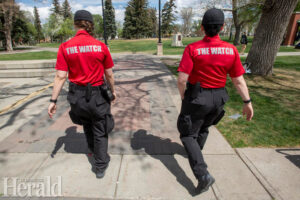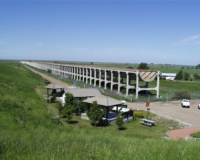Call to defund Watch sparks debate
By Jensen, Randy on June 26, 2020.
 Herald file photo by Ian Martens -
Members of the Watch patrol through Galt Gardens downtown last year shortly after the program's launch. @IMartensHerald
Herald file photo by Ian Martens -
Members of the Watch patrol through Galt Gardens downtown last year shortly after the program's launch. @IMartensHeraldTim Kalinowski
Lethbridge Herald
tkalinowski@lethbridgeherald.com
A presentation on defunding The Watch program heard at the Lethbridge Police Commission Wednesday evening stirred interesting debate and an important dialogue about the ongoing role of The Watch in the community, and its relationship, particularly, with disenfranchised peoples in downtown Lethbridge.
Prior to presenters Rebecca Runions and Jaisie Walker speaking about their concerns, Faron Ellis of Lethbridge College gave his annual Lethbridge Police Service Performance Evaluation, which was essentially a telephone survey conducted earlier this year and completed by February which asked people how they felt about the job the police are doing, perceptions of public safety and also respondents’ feelings about The Watch program.
Ellis said the survey showed a high degree of confidence in the local police force and about an 88 per cent approval rating from the public on The Watch itself among the roughly 700 residents whose comments were captured in the survey.
“Residents are very supportive,” said Ellis. “Rarely do you get 88 per cent support for a program, particularly a new program, particularly a program that costs considerable dollars to administer. About half (of those surveyed) think it is a good idea, Over a third think it is a very good idea; so combined we’ve got 88 per cent approaching 90 per cent thinking they like the idea of a Watch.”
Under questioning from commissioners, Ellis admitted the survey does not capture any specific racial demographic sections about who was in favour, and was limited to those with phones.
In the same survey, Ellis said there had been a precipitous decline in the public’s perception of safety in the downtown over the last year, with about 50 per cent feeling safe and 50 per cent feeling unsafe even with The Watch program in effect.
Part of The Watch’s purpose was to enhance the public’s feelings of safety in the downtown. Ellis was asked if The Watch had fallen short in its purpose if fewer people were now feeling safe in the downtown than before The Watch came into existence?
“Commissioner Griffiths said when asked a similar question last year: the declining perception of safety doesn’t jive with the police stats,” Ellis explained.
“Not many people have had a bad encounter, a criminal encounter, downtown. But you don’t have to have a bad encounter downtown to have your perception changed. Perceptions are driven by a lot of things: social media, the regular reporting of crimes. So it’s the combination of the reporting of problems downtown, the publicity the supervised consumption site has gotten, which is technically not even located downtown. All of the issues, particularly the drug crisis, has led to a perception amongst an increasingly large number of Lethbridge residents that the downtown is not safe.”
“I wouldn’t say The Watch program has been a failure (in that respect),” he added, “because people do like it, but The Watch program is relatively new. So a lot of people are saying, ‘I like it,’ but it’s going to take time for it to have an impact.”
Later, in their presentation, Walker critiqued the survey results and pointed out the relatively small sample size captured in the survey. They also pointed to an online petition which had received nearly 6,000 signatures supporting the idea The Watch program should be defunded, and for the money to be moved over to pay for greater social and mental health supports for the city’s poorest and most vulnerable.
“I would like to draw attention to who this sample is drawn from and who it excludes,” they/them said referring to the phone survey, “particularly a large portion of the population who have had direct contact with policing and police officers.”
Walker, flanked by Runions, then made their case for defunding The Watch. Referencing conversations they and their group have had with frontline social workers, business owners, academics, those who work in harm-reduction programs and a few former Watch volunteers, they/them stated:
“Our community is overwhelmingly united in our concerns about frequency of violence and racial profiling enacted by The Watch against the unhoused population in Lethbridge’s downtown core; as well as the ineffective use of these funds.”
Walker said besides experiencing feelings of bullying and harassment from some Watch members, many among Lethbridge’s homeless community, inherently distrust an agency like The Watch which is directly connected to the Lethbridge Police Service.
“There is an inherent distrust of the police by our unhoused population as a result of systemic racism, which is, unfortunately, a barrier to forming relationships between The Watch and unhoused populations,” they/them explained. “There are countless testimonies of Watch volunteers profiling Indigenous folks acting in threatening and violent ways and being unable to address the complex needs of our community.”
In questioning after the presentation, Commissioner member Blaine Hyggen pointed out Ellis’ scientifically valid survey showed “the vast majority of Lethbridge residents, 88.8 per cent, feel the LPS-initiated Watch program is a good idea,” stated Hyggen. “That means slightly more than one in 10 think The Watch is a poor idea, with a very small per cent of those, 2.7 per cent, believing it is a very poor idea. Could this be skewed so much you find this statistically not valid?”
Commissioner Robert Van Spronsen said he appreciated hearing about The Watch in another context, but still felt the program had merit in the community.
“For me, personally, it gave another side that I had not considered, and that is the perception Watch members may have among the homeless population,” he said. “But my question is why does it have to be an either/or? What you are saying tells me we maybe need to look at where maybe it’s a training issue. Why defund a program that came out of a concern for the safety of our citizens and as a way to get some support there without having more officers?”
He said he was open to improving what they do, but not “throwing the baby out with the bathwater.”
Walker later said they/them was disappointed many on the commission seemed to be thinking the same way as Van Spronsen based on the comments she heard.
“I think they were just considering reform. We weren’t incredibly optimistic about if we were heard, but I think we certainly got a reaction.”
Walker acknowledged they and other defund-The-Watch supporters were perhaps coming from irreconcilable points of view with commissioners, police and those in the community who support The Watch’s current “surveillance model.”
“The Watch has not decreased homelessness, and it has not decreased the amount of drug paraphernalia downtown,” they/them stated. “Over and over again, we see that if we approach people suffering from systemic issues such as homelessness and racism, if we approach them from a support model and ask how we can support you, crime gets reduced. If you treat people like a problem that needs to be eradicated, managed or disappeared that problem does not go away. Tensions increase and social inequalities increase.”
Chief Scott Woods disagreed with Runions and Walker’s categorizations of The Watch and the Lethbridge Police Service.
“We as the police are very supportive of all the programs people want out there for homelessness, addictions, mental health and all those things happening in the community,” he explained. “We are extremely supportive of that and support that more resources need to be put toward those things. But I don’t think the way forward is to attack a program like The Watch in order for that to be your target, and suggest this is the path forward by getting rid of The Watch. The Watch is doing a lot of good things.”
He acknowledged the “defund” movement was an offshoot of the broader conversations going on in society at the moment about the role of policing.
“We do have a high level of support in the community, but that is not to discount some of the things that are going on,” he said. “We do need to have some reform, and we do have to have a look inside. Looking at the way we are doing things: policies, procedures, and just what the community is saying, and what they would like to see change. And make some of those changes going forward in order to be a better police service and serve the community better.”
Follow @TimKalHerald on Twitter
33-32




